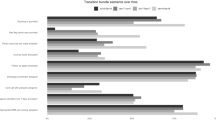Abstract
Background
During hospital stay after birth, preterm infants are susceptible to late-onset sepsis (LOS).
Objective
To study the effect of family integrated care in single family rooms (SFRs) compared to standard care in open bay units (OBUs) on LOS. Peripheral or central venous catheters (PVCs/CVCs) and parenteral nutrition (PN) were investigated as potential mediators. Secondary outcomes were length of stay, exclusive breastfeeding at discharge, and weight gain during hospital stay.
Methods
Single-center retrospective before-after study with preterm infants admitted ≥3 days.
Results
We studied 1,046 infants (468 in SFRs, 578 in OBUs, median gestational age 35 weeks). SFRs were associated with less LOS (adjusted odds ratio (OR) 0.486, 95% confidence interval (CI): 0.293; 0.807, p = 0.005). PVCs (indirect effect −1.757, 95% CI: −2.738; −1.068), CVCs (indirect effect −1.002, 95% CI: −2.481; 0.092), and PN (indirect effect −1.784, 95% CI: −2.688; −1.114) were possible mediators of the effect. PN was the main mediator of the effect of SFRs on LOS. We found shorter length of stay (median length of stay in SFRs 10 days and in OBUs 12 days, adjusted β −0.088, 95% CI: −0.159; −0.016, p = 0.016), but no differences in weight gain or exclusive breastfeeding at discharge.
Conclusions
SFRs were associated with decreased incidences of LOS and shorter length of hospital stay. The positive effect of SFRs on LOS was mainly mediated through a decreased use of PN in SFRs.
Impact
-
Family integrated care (FICare) in single family rooms for preterm infants was associated with less late-onset sepsis events during hospital stay and a shorter length of hospital stay after birth.
-
FICare in single family rooms was associated with less use of peripheral or central venous catheters and parenteral nutrition.
-
Mediation analysis provided insights into the mechanisms underlying the effect of FICare in single family rooms on late-onset sepsis and helped explain the differences observed in late-onset sepsis between FICare in single family rooms and open bay units.
-
The reduction in late-onset sepsis in FICare in single family rooms was mediated by a reduced use of intravenous catheters and parenteral nutrition.
Similar content being viewed by others
Log in or create a free account to read this content
Gain free access to this article, as well as selected content from this journal and more on nature.com
or
References
Blencowe, H. et al. National, regional, and worldwide estimates of preterm birth rates in the year 2010 with time trends since 1990 for selected countries: a systematic analysis and implications. Lancet 379, 2162–2172 (2012).
Shane, A. L., Sánchez, P. J. & Stoll, B. J. Neonatal sepsis. Lancet 390, 1770–1780 (2017).
Dong, Y. & Speer, C. P. Late-onset neonatal sepsis: recent developments. Arch. Dis. Child Fetal Neonatal Ed. 100, F257–F263 (2015).
Downey, L. C., Smith, P. B. & Benjamin, D. K. Risk factors and prevention of late-onset sepsis in premature infants. Early Hum. Dev. 86, 7–12 (2010).
Ramasethu, J. Prevention and treatment of neonatal nosocomial infections. Matern. Health Neonatol. Perinatol. 3, 5 (2017).
Flacking, R. et al. Closeness and separation in neonatal intensive care. Acta Paediatr. Int. J. Paediatr. 101, 1032–1037 (2012).
EFCNI. European Standards of Care for Newborn Health: NICU Design (2018).
EFCNI et al. European Standards of Care for Newborn Health: Parental Involvement (2018).
Van Veenendaal, N. R. et al. Hospitalising preterm infants in single family rooms versus open bay units: a systematic review and meta-analysis. Lancet Child Adolesc. Health 3, 147–157 (2019).
Li, X. Y. et al. Breaking down barriers: enabling care-by-parent in neonatal intensive care units in China. World J. Pediatr. 13, 144–151 (2017).
Bhutta, Z. A. et al. Reducing length of stay in hospital for very low birthweight infants by involving mothers in a stepdown unit: an experience from Karachi (Pakistan). BMJ 329, 1151–1155 (2004).
Stelwagen, M. A. et al. Integration of maternity and neonatal care to empower parents. J. Obstet. Gynecol. Neonatal Nurs. 49, 65–77 (2020).
O’Brien, K. et al. Effectiveness of family integrated care in neonatal intensive care units on infant and parent outcomes: a multicentre, multinational, cluster-randomised controlled trial. Lancet Child Adolesc. Health 2, 245–254 (2018).
Des Jarlais, D., Lyles, C. & Crepaz, N., the TREND Group. Improving the reporting quality of nonrandomized evaluations of behavioral and public health interventions: the TREND Statement. Am. J. Public Health 94, 361–366 (2004).
Fitchett, E. J. A. et al. Strengthening the Reporting of Observational Studies in Epidemiology for Newborn Infection (STROBE-NI): an extension of the STROBE statement for neonatal infection research. Lancet Infect. Dis. 16, e202–e213 (2016).
Davidson, J. E. et al. Guidelines for family-centered care in the neonatal, pediatric, and adult ICU. Crit. Care Med. 45, 103–128 (2017).
Voos, K. C. et al. Effects of implementing family-centered rounds (FCRs) in a neonatal intensive care unit (NICU). J. Matern. Neonatal Med. 24, 1–4 (2011).
Galarza-Winton, M. E. et al. Implementing family-integrated care in the NICU: educating nurses. Adv. Neonatal Care 13, 335–340 (2013).
Jiang, S. et al. Parents as practitioners in preterm care. Early Hum. Dev. 90, 781–785 (2014).
Cormack, B. E. et al. Comparing apples with apples: it is time for standardized reporting of neonatal nutrition and growth studies. Pediatr. Res. 79, 810–820 (2016).
Labbok, M. & Krasovec, K. Toward consistency in breastfeeding definitions. Stud. Fam. Plann. 21, 226 (1990).
Sterne, J. A. C. et al. Multiple imputation for missing data in epidemiological and clinical research: potential and pitfalls. BMJ 338, 1–7 (2009).
Van Buuren, S. & Groothuis-Oudshoorn, K. Multivariate imputation by chained equations. J. Stat. Softw. 45, 1–67 (2011).
Heymans, M. & Eekhout, I. Applied Missing Data Analysis With SPSS and (R)Studio (Amsterdam, 2019).
MacKinnon, D. P. et al. Mediation analysis. Annu. Rev. Psychol. 58, 593–614 (2007).
Schomaker, M. & Heumann, C. Bootstrap inference when using multiple imputation. Stat. Med. 37, 2252–2266 (2018).
R Development Core Team. R: A Language and Environment for Statistical Computing (R Found Stat Comput., Austria, 2016).
Zhang, Z. Missing data exploration: highlighting graphical presentation of missing pattern. Ann. Transl. Med. 3, 356 (2015).
Stevenson, M. epiR: Tools for the Analysis of Epidemiological Data 1–119 https://CRAN.R-project.org/package=epiR (2019).
Beaujean, A. A. Latent variable modeling using R Package “BaylorEdPsych” 1–16 (2015).
Canty, A. & Ripley B. Package “boot” 1–117 https://cran.r-project.org/web/packages/boot/boot.pdf (2019).
Yeung, C. Y., Lee, H. C., Huang, F. Y. & Wang, C. S. Sepsis during total parenteral nutrition: exploration of risk factors and determination of the effectiveness of peripherally inserted central venous catheters. Pediatr. Infect. Dis. J. 17, 135–142 (1998).
el Manouni el Hassani, S. et al. Risk factors for late-onset sepsis in preterm infants: a multicenter case–control study. Neonatology 116, 42–51 (2019).
Franck, L. S., Cox, S., Allen, A. & Winter, I. Parental concern and distress about infant pain. Arch. Dis. Child Fetal Neonatal Ed. 89, F71–F75 (2004).
Weiss, E. M. et al. Parental decision-making preferences in neonatal intensive care. J. Pediatr. 179, 36–41 (2016).
Pineda, R. et al. Parent participation in the neonatal intensive care unit: predictors and relationships to neurobehavior and developmental outcomes. Early Hum. Dev. 117, 32–38 (2018).
Franck, L. S. et al. Parent involvement in pain management for NICU infants: a randomized controlled trial. Pediatrics 128, 510–518 (2011).
Lester, B. M. et al. Single-family room care and neurobehavioral and medical outcomes in preterm infants. Pediatrics 134, 754–760 (2014).
Lester, B. M. et al. 18-Month follow-up of infants cared for in a single-family room neonatal intensive care unit. J. Pediatr. 177, 84–89 (2016).
Jackson, K., Ternestedt, B.-M. & Schollin, J. From alienation to familiarity: experiences of mothers and fathers of preterm infants. J. Adv. Nurs. 43, 120–129 (2003).
Camacho-Gonzalez, A., Spearman, P. W. & Stoll, B. J. Neonatal infectious diseases. Evaluation of neonatal sepsis. Pediatr. Clin. N. Am. 60, 367–389 (2013).
Ortenstrand, A. et al. The Stockholm Neonatal Family Centered Care Study: effects on length of stay and infant morbidity. Pediatrics 125, e278–e285 (2010).
Melnyk, B. M. et al. Reducing premature infants’ length of stay and improving parents’ mental health outcomes with the Creating Opportunities for Parent Empowerment (COPE) Neonatal Intensive Care Unit Program: a randomized, controlled trial. Pediatrics 118, e1414–e1427 (2006).
Muraskas, J. & Parsi, K. The cost of saving the tiniest lives: NICUs versus prevention. Virtual Mentor. 10, 655–658 (2008).
Raiskila, S. et al. Trends in care practices reflecting parental involvement in neonatal care. Early Hum. Dev. 90, 863–867 (2014).
El-Farrash, R. A. et al. Longer duration of kangaroo care improves neurobehavioral performance and feeding in preterm infants: a randomized controlled trial. Pediatr. Res. 87, 683–688 (2019).
Boundy, E. O. et al. Kangaroo mother care and neonatal outcomes: a meta-analysis. Pediatrics 137, e20152238 (2016).
Acknowledgements
N.R.v.V. is supported by an unrestricted research grant, provided by Nutricia, the Netherlands, during the conduct of the study. A.A.M.W.v.K. and S.R.D.v.d.S. are supported by research grants, provided by Nutricia, the Netherlands, outside the submitted work.
Author information
Authors and Affiliations
Contributions
N.R.v.V., S.R.D.v.d.S., A.A.M.W.v.K., and J.B.v.G. developed the design and database of this study. N.R.v.V. performed acquisition of the data. N.R.v.V. performed the data analysis. J.J.M.R. provided insights into the use of mediation models, M.W.H. provided insights into the multiple imputation model. M.W.H. provided the script for the bootstrapping of indirect effects in the imputed database. A.A.M.W.v.K. reviewed infants with sepsis events. J.W.R.T. and W.H.H. provided insight into the use of regression models and conduct of the study and data analysis. N.R.v.V. drafted the first version of the manuscript. N.R.v.V., S.R.D.v.d.S., W.H.H., J.J.M.R., M.W.H., J.W.R.T., J.B.v.G., and A.A.M.W.v.K. all contributed to revising the manuscript critically for important intellectual content and approving this paper to be published. N.R.v.V., S.R.D.v.d.S., and A.A.M.W.v.K. are the guarantors of this study; they accept full responsibility for the work and the conduct of the study, had full access to the data, and controlled the decision to publish. The corresponding author attests that all listed authors meet authorship criteria and that no others meeting the criteria have been omitted.
Corresponding author
Ethics declarations
Competing interests
The authors declare no competing interests.
Ethics approval
This study was reviewed and approved by the Institutional Review Board of OLVG Hospital, Amsterdam, the Netherlands. For this retrospective chart study, no informed consent was required.
Additional information
Publisher’s note Springer Nature remains neutral with regard to jurisdictional claims in published maps and institutional affiliations.
Supplementary Information
Rights and permissions
About this article
Cite this article
van Veenendaal, N.R., van der Schoor, S.R.D., Heideman, W.H. et al. Family integrated care in single family rooms for preterm infants and late-onset sepsis: a retrospective study and mediation analysis. Pediatr Res 88, 593–600 (2020). https://doi.org/10.1038/s41390-020-0875-9
Received:
Revised:
Accepted:
Published:
Version of record:
Issue date:
DOI: https://doi.org/10.1038/s41390-020-0875-9
This article is cited by
-
The effects of the introduction of the single-family room in neonatal and paediatric intensive care on the outcomes of paediatric patients, families, staff, and organizations: a mixed method systematic review
BMC Health Services Research (2025)
-
“More than medical care”: a qualitative study on family support systems in the neonatal intensive care unit in Ghana
BMC Pediatrics (2025)
-
Short and mid-term neonatal outcomes in high-risk infants undergoing FICare: a case control study
Pediatric Research (2025)
-
RISEinFAMILY project: the integration of families at neonatal intensive care units (NICUs) to empower them as primary caregivers: study protocol for a stepped wedge cluster controlled trial
Trials (2024)
-
Nutritional intake and growth until two years of age in moderate and late preterms
Pediatric Research (2024)



